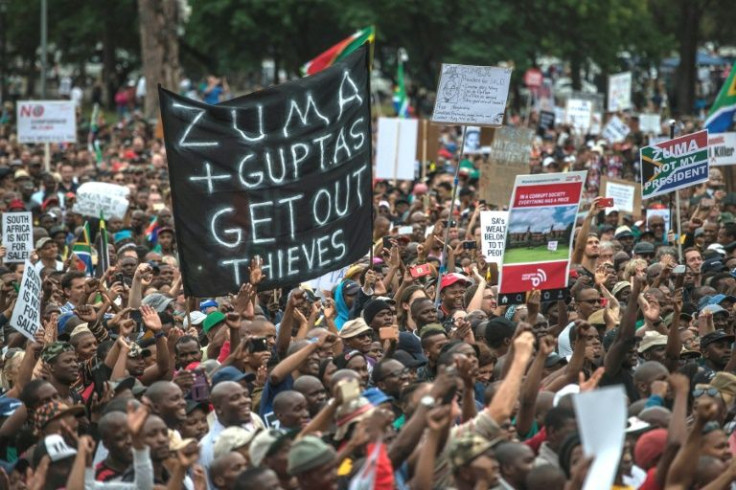South Africa: The Incredible Rise And Fall Of Gupta Brothers

From a small town in India's northern Uttar Pradesh to calling shots in South African government, owing to their proximity to former President Jacob Zuma, the story of the Gupta brothers seems right out of a Hollywood drama.
Though the Guptas' undue influence on former South African President Jacob Zuma came to light in 2013, the day was not around the corner for the fugitive India-born brothers till Interpol added them to its most-wanted list in February this year.
Two members of the Gupta family, Rajesh and Atul, were arrested in the United Arab Emirates (UAE) on 6 June for stealing 500 billion rands (over $ 32 billion) from the state exchequer during Zuma's nine-year stint as head of Africa's biggest economy.
The Dubai police said in a statement that the brothers are being held for money laundering and criminal charges in South Africa.
The Guptas had a humble beginning in South Africa after the family's patriarch, Shiv Kumar Gupta, sent his three children to tap opportunities in South Africa.
The three Gupta brothers - Ajay (56), Atul (54), and Rajesh (51) - hail from the northern Indian state of Uttar Pradesh and migrated to South Africa in 1993, shortly before apartheid rule ended and Nelson Mandela became the country's first elected leader. The elder brother is not yet arrested, however.
They started with a distribution business selling computers and components. Later, the company's name was changed to Sahara Computers and Sahara Systems -- named after their hometown Saharanpur in India.
With South Africa opening up its economy, the Guptas' empire expanded to computers, mining, engineering, media, as well as passenger airlines. The Sahara Estate in the capital Johannesburg's affluent suburb comprises four mansions which are roughly valued at about 52 million rands (over $3 million).
The Guptas first met the then-Vice President Zuma in 2003, marking the beginning of an intimate relationship. As soon as Zuma assumed the charge of the country's president, their ties were cemented further.
Duduzane Zuma, one of Zuma's sons, became a director in Guptas-owned firms, while Zuma's daughter, Duduzile Zuma, was roped in as a senior member of the company. Bongi Ngema, Zuma's third wife, was hired as an employee by the Guptas.
The business deals between the Guptas and the Zumas became so inextricably tied that they were dubbed as the Zuptas.
Due to their deep ties with Zuma, they could land a plane carrying guests for a wedding at the Waterkloof Air Base - a military air base meant to be used for receiving heads of state -- in 2013. Though the people were up in arms, they could get away with it.
Though numerous witnesses have alleged that the Gupta brothers worked with the former president to siphon money from state-funded transportation, power, and arms firms, the Gupta brothers and Zuma have refuted the claims. Witnesses also said that due to their vast influence on the Zuma administration, the businessmen had a say in deciding cabinet berths.
The brothers' role in handpicking ministers came to light in December 2015, when Zuma sacked the then-Finance Minister, Nhlanhla Nene, and replaced him with little-known lawmaker Des Van Rooyen. Following a hue and cry, Rooyen was removed four days later as the move caused the rand to crash.
By 2017, their nexus with top leadership emerged after several emails showing the Guptas' hold over South African politics were leaked. The family fled South Africa in 2018 and moved to the UAE. Subsequently, the ruling African National Congress removed Zuma and appointed Cyril Ramaphosa as acting president.
Though the Guptas were charged by the South African government in 2018 in connection with a shady tender for a dairy project in the central Free State province, the brothers fled to the UAE, which had no extradition treaty with South Africa then.
In 2018, South Africa petitioned the UAE to extradite the Gupta brothers, but did not succeed, forcing South Africa to appeal to the UN to get the Guptas back to the country. The following year, the US slapped sanctions, including travel bans and asset freezes, on them, accusing them of being "members of a significant corruption network."
Last year, the United Kingdom followed suit and declared the three brothers persona non grata. When Interpol added the two brothers to its most-wanted list in February this year and issued Red Notices the last nail on their coffin was sealed.
The brothers are accused of money laundering in India, where taxmen raided their homes in multiple places across the country and their company's headquarters in New Delhi in 2018.
Despite South Africa ratifying an extradition treaty in April 2021 with the UAE, it is not clear whether they will be deported to South Africa. Currently, talks are on between law enforcement agencies in the UAE and South Africa.
South Africa is not going to get the Guptas back to the country all of a sudden until the wealthy family exhausts all the avenues available to it to fight their extradition from the UAE.
























